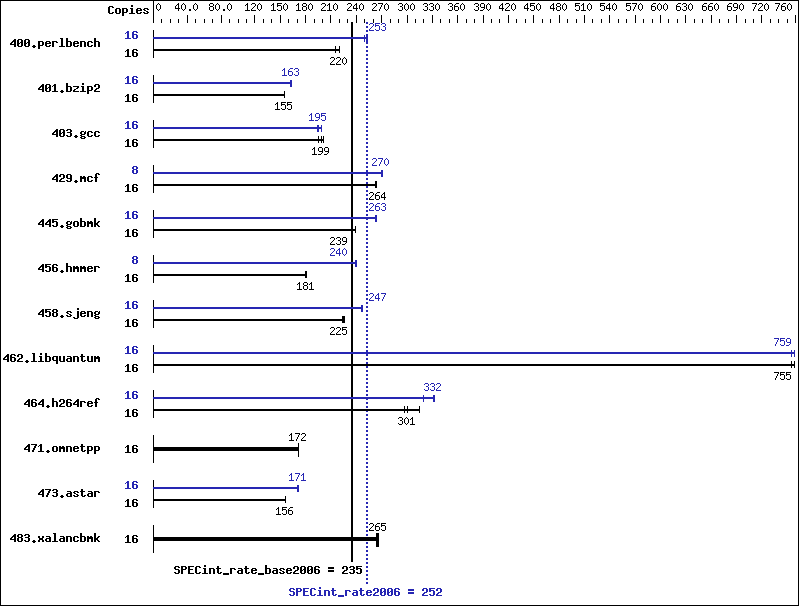| CPU2006 license: | 11 | Test date: | Feb-2009 |
|---|---|---|---|
| Test sponsor: | IBM Corporation | Hardware Availability: | Apr-2009 |
| Tested by: | IBM Corporation | Software Availability: | Jan-2009 |

| Hardware | |
|---|---|
| CPU Name: | Intel Xeon X5570 |
| CPU Characteristics: | Intel Turbo Boost Technology up to 3.33 GHz |
| CPU MHz: | 2933 |
| FPU: | Integrated |
| CPU(s) enabled: | 8 cores, 2 chips, 4 cores/chip, 2 threads/core |
| CPU(s) orderable: | 1,2 chips |
| Primary Cache: | 32 KB I + 32 KB D on chip per core |
| Secondary Cache: | 256 KB I+D on chip per core |
| L3 Cache: | 8 MB I+D on chip per chip |
| Other Cache: | None |
| Memory: | 24 GB (6 x 4 GB PC3-10600R) |
| Disk Subsystem: | 1 x 73 GB SAS, 15000 RPM |
| Other Hardware: | None |
| Software | |
|---|---|
| Operating System: | Red Hat Enterprise Linux 5 (x86_64) Update 3, Kernel 2.6.18-128.e15 |
| Compiler: | Intel C++ Compiler Professional 11.0 for Linux Build 20090131 Package ID: l_cproc_p_11.0.080 |
| Auto Parallel: | No |
| File System: | ext3 |
| System State: | Run level 3 (multi-user) |
| Base Pointers: | 32-bit |
| Peak Pointers: | 32/64-bit |
| Other Software: | Microquill SmartHeap V8.1 Binutils 2.18.50.0.7.20080502 |
Results Table
| Benchmark | Base | Peak | ||||||||||||
|---|---|---|---|---|---|---|---|---|---|---|---|---|---|---|
| Copies | Seconds | Ratio | Seconds | Ratio | Seconds | Ratio | Copies | Seconds | Ratio | Seconds | Ratio | Seconds | Ratio | |
| Results appear in the order in which they were run. Bold underlined text indicates a median measurement. | ||||||||||||||
| 400.perlbench | 16 | 711 | 220 | 711 | 220 | 724 | 216 | 16 | 619 | 253 | 627 | 249 | 617 | 253 |
| 401.bzip2 | 16 | 997 | 155 | 997 | 155 | 997 | 155 | 16 | 952 | 162 | 946 | 163 | 946 | 163 |
| 403.gcc | 16 | 647 | 199 | 640 | 201 | 660 | 195 | 16 | 649 | 198 | 665 | 194 | 661 | 195 |
| 429.mcf | 16 | 555 | 263 | 553 | 264 | 552 | 264 | 8 | 270 | 270 | 270 | 270 | 270 | 271 |
| 445.gobmk | 16 | 703 | 239 | 703 | 239 | 702 | 239 | 16 | 637 | 263 | 638 | 263 | 638 | 263 |
| 456.hmmer | 16 | 826 | 181 | 824 | 181 | 827 | 180 | 8 | 312 | 239 | 312 | 240 | 311 | 240 |
| 458.sjeng | 16 | 862 | 225 | 864 | 224 | 858 | 226 | 16 | 785 | 246 | 783 | 247 | 782 | 248 |
| 462.libquantum | 16 | 439 | 755 | 437 | 758 | 439 | 755 | 16 | 439 | 755 | 437 | 759 | 437 | 759 |
| 464.h264ref | 16 | 1125 | 315 | 1190 | 297 | 1177 | 301 | 16 | 1066 | 332 | 1067 | 332 | 1107 | 320 |
| 471.omnetpp | 16 | 582 | 172 | 582 | 172 | 582 | 172 | 16 | 582 | 172 | 582 | 172 | 582 | 172 |
| 473.astar | 16 | 720 | 156 | 720 | 156 | 719 | 156 | 16 | 655 | 171 | 655 | 171 | 657 | 171 |
| 483.xalancbmk | 16 | 414 | 267 | 418 | 264 | 416 | 265 | 16 | 414 | 267 | 418 | 264 | 416 | 265 |
Submit Notes
The config file option 'submit' was used. numactl was used to bind copies to the cores 'ulimit -s unlimited' was used to set the stack size to unlimited prior to run
General Notes
Processor CPU C-States Enabled Memory set to Max Speed
Base Portability Flags
| 400.perlbench: | -DSPEC_CPU_LINUX_IA32 |
| 462.libquantum: | -DSPEC_CPU_LINUX |
| 483.xalancbmk: | -DSPEC_CPU_LINUX |
Base Optimization Flags
C benchmarks:
| -xSSE4.2 -ipo -O3 -no-prec-div -static -inline-calloc -opt-malloc-options=3 -opt-prefetch |
C++ benchmarks:
| -xSSE4.2 -ipo -O3 -no-prec-div -opt-prefetch -Wl,-z,muldefs -L/spec/cpu2006.1.1/lib -lsmartheap |
Peak Compiler Invocation
C benchmarks (except as noted below):
| icc | |
| 401.bzip2: | /opt/intel/Compiler/11.0/080/bin/intel64/icc |
| 456.hmmer: | /opt/intel/Compiler/11.0/080/bin/intel64/icc |
| 458.sjeng: | /opt/intel/Compiler/11.0/080/bin/intel64/icc |
C++ benchmarks (except as noted below):
| icpc | |
| 473.astar: | /opt/intel/Compiler/11.0/080/bin/intel64/icpc |
Peak Portability Flags
| 400.perlbench: | -DSPEC_CPU_LINUX_IA32 |
| 401.bzip2: | -DSPEC_CPU_LP64 |
| 456.hmmer: | -DSPEC_CPU_LP64 |
| 458.sjeng: | -DSPEC_CPU_LP64 |
| 462.libquantum: | -DSPEC_CPU_LINUX |
| 473.astar: | -DSPEC_CPU_LP64 |
| 483.xalancbmk: | -DSPEC_CPU_LINUX |
Peak Optimization Flags
C benchmarks:
C++ benchmarks:
| 471.omnetpp: | basepeak = yes |
| 473.astar: | -xSSE4.2(pass 2) -prof-gen(pass 1) -ipo(pass 2) -O3(pass 2) -no-prec-div(pass 2) -prof-use(pass 2) -ansi-alias -opt-ra-region-strategy=routine -auto-ilp32 -Wl,-z,muldefs -L/spec/cpu2006.1.1/lib -lsmartheap64 |
| 483.xalancbmk: | basepeak = yes |
